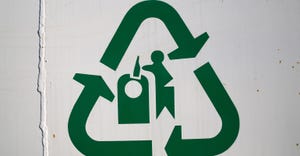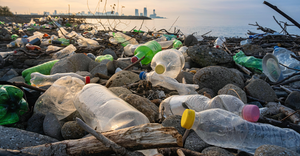November 1, 2006
Jennifer Grzeskowiak
In a move that will both facilitate greenhouse gas emissions reduction and bring about financial benefits, the Lancaster County Solid Waste Management Authority (LCSWMA) in Pennsylvania has joined the Chicago Climate Exchange (CCX). While the authority is the first public environmental services organization to sign on, Jim Warner, executive director of LCSWMA, doesn't believe it will be the last.
By joining CCX, members voluntarily agree to reduce their greenhouse gas emissions output by 4 percent by the end of 2006 or 6 percent by the end of 2010, either through actual reductions or through offset projects, such as providing renewable energy and methane destruction. Groups that exceed the percentage to which they have committed receive credits that they can sell on the exchange. Members also can purchase those credits to meet reduction requirements.
When Warner learned about the exchange through a display at a waste industry event, he saw an opportunity to take advantage of emissions reduction efforts the authority already had in place. Earlier in the year, LCSWMA began providing landfill gas for a 3.2 megawatt landfill gas-to-energy (LFGE) plant, which is owned and operated by Allentown, Pa.-based PPL Corp. “You just need to be active in seeking out the opportunities depending on your specific operations,” Warner says.
LCSWMA's main source of greenhouse gas emissions is its waste-to-energy plant, followed by its fleet. Because the landfill wasn't legally required to install an LFGE system, the authority is able to count all of the landfill gas collected toward its emissions reduction goal.
“Our advantage is that we were willing to invest $1.3 million in an LFG system when we didn't have to,” Warner says. “In our case, trying to do the best practices has paid off.” The authority's first trade on Oct. 16 was for $38,500, netting LCSWMA $34,540.
Solid waste experts agree with Warner that more industry members will become involved in exchanging emissions reduction credits. “There are many ways that emissions can be reduced and many innovative things being done,” says John Skinner, executive director of the Solid Waste Association of North America. He adds that tax credits for LFGE systems and increases in energy prices will make investing in emissions reduction technology more economical for the industry. He would like to see recycling added to the list of activities that can generate credit.
In a recent white paper, the National Solid Wastes Management Association (NSWMA) lists emissions reduction credit trading as a means of further cutting back greenhouse gas output. “There's such an enormous emphasis on reducing greenhouse gas emissions, and methane is important in that,” says Bruce Parker, president and CEO of NSWMA. He says that the tradable emissions credits are attractive for members, who can then sell them for money or use them to offset facility expansions and still meet emissions caps.
Waste Management, one of the founding members of the exchange, remains the only waste company on the exchange's membership roster, according to a CCX spokesperson. To attract members from the industry, CCX has set up displays at waste events, including the recent WASTECON show.
As CCX expands, its aim is to continue helping the market find the most economical ways to reduce emissions. Warner believes that methane capture holds the most promise. “I've talked to peers who have old, closed landfills, and they aren't required to put in landfill gas collection systems,” he says. “They need to make a serious decision about whether this investment might have some kind of payback. The trading platform is the economic benefit.”
You May Also Like


